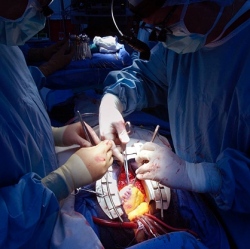
New research indicates that inactive patients following cardiac surgery have a substantially higher risk of depression and that the number of patients suffering from depression after cardiac surgery is as high as 40%.
Investigators recommend that cardiac patients should be assessed for depression and level of physical activity and remain as active as they safely can after surgery to minimize post-operative depression. The results are published in the December issue of the Canadian Journal of Cardiology.
Major depressive disorder is an independent risk factor for the development of coronary artery disease (CAD) and increases the risk of cardiac events and premature death. Prevalence estimates of depression among patients with CAD requiring cardiac surgery ranges from 23% and 47%, which is higher than the general CAD population, including those who have had a heart attack, and is nearly twice as common as in the general population without cardiac disease.
Approximately half of patients suffering from depression before cardiac surgery remain depressed one year after surgery, and an additional 20% of patients who undergo coronary artery bypass grafting experience new or elevated depressive symptoms after surgery. Moderate to severe depression after cardiac surgery increases the risk of further cardiac complications.
Evidence describing the change in physical activity status before and after cardiac surgery, and whether physical activity status is associated with depressive symptoms following surgery, is limited. Investigators from the University of Manitoba therefore sought to define who is at risk for depression after surgery, whether all patients experience similar mood changes, how and when physical activity changes, and how this affects depression after surgery.
They conducted the Impact of Physical Activity on Depression After Cardiac Surgery (IPAD-CS) study to assess 436 patients who were undergoing elective cardiac surgery or awaiting in-hospital cardiac surgery requiring cardiopulmonary bypass in 2010-2011. Patients were assessed for short-term depression and physical activity behavior before surgery, at hospital discharge, and three and six months after surgery. Patients were categorized as “depression naïve,” “at risk,” or “depressed” before surgery and as physically “inactive” or “active” based on their activities over the preceding seven days.
